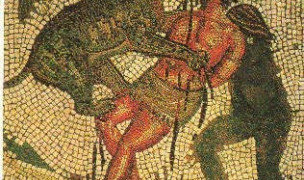 20 Terms
20 TermsHome > Terms > English (EN) > Karl Marx
Karl Marx
Karl Heinrich Marx (5 May 1818 – 14 March 1883) was a German philosopher, economist, sociologist, historian, journalist, and revolutionary socialist. Marx's work in economics laid the basis for the current understanding of labour and its relation to capital, and has influenced much of subsequent economic thought. He published numerous books during his lifetime, the most notable being The Communist Manifesto (1848) and Das Kapital (1867–1894).
Born into a wealthy middle-class family in Trier in the Prussian Rhineland, Marx studied at the University of Bonn and the University of Berlin, where he became interested in the philosophical ideas of the Young Hegelians. After his studies, he wrote for a radical newspaper in Cologne, and began to work out his theory of dialectical materialism. He moved to Paris in 1843, where he began writing for other radical newspapers and met Fredrick Engels, who would become his lifelong friend and collaborator. In 1849 he was exiled and moved to London together with his wife and children where he continued writing and formulating his theories about social and economic activity. He also campaigned for socialism and became a significant figure in the International Workingmen's Association.
Marx's theories about society, economics and politics – collectively known as Marxism – hold that human societies progress through class struggle: a conflict between an ownership class that controls production and a dispossessed labouring class that provides the labour for production. He called capitalism the "dictatorship of the bourgeoisie," believing it to be run by the wealthy classes for their own benefit; and he predicted that, like previous socioeconomic systems, capitalism produced internal tensions which would lead to its self-destruction and replacement by a new system: socialism. He argued that class antagonisms under capitalism between the bourgeoisie and proletariat would eventuate in the working class' conquest of political power in the form of a dictatorship of the proletariat and eventually establish a classless society, socialism or communism, a society governed by a free association of producers. Along with believing in the inevitability of socialism and communism, Marx actively fought for their implementation, arguing that social theorists and underprivileged people alike should carry out organised revolutionary action to topple capitalism and bring about socio-economic change.
Marx has been described as one of the most influential figures in human history. Revolutionary socialist governments espousing Marxist concepts took power in a variety of countries in the 20th century, leading to the formation of such socialist states as the Soviet Union in 1922 and the People's Republic of China in 1949. Many labour unions and workers' parties worldwide are influenced by Marxism, while various theoretical variants, such as Leninism, Stalinism, Trotskyism, and Maoism, were developed from them. Marx is typically cited, with Émile Durkheim and Max Weber, as one of the three principal architects of modern social science.
Other Languages:
Member comments
Terms in the News
Billy Morgan
Sports; Snowboarding
The British snowboarder Billy Morgan has landed the sport’s first ever 1800 quadruple cork. The rider, who represented Great Britain in the 2014 Winter Olympics in Sochi, was in Livigno, Italy, when he achieved the man-oeuvre. It involves flipping four times, while body also spins with five complete rotations on a sideways or downward-facing axis. The trick ...
Marzieh Afkham
Broadcasting & receiving; News
Marzieh Afkham, who is the country’s first foreign ministry spokeswoman, will head a mission in east Asia, the state news agency reported. It is not clear to which country she will be posted as her appointment has yet to be announced officially. Afkham will only be the second female ambassador Iran has had. Under the last shah’s rule, Mehrangiz Dolatshahi, a ...
Weekly Packet
Language; Online services; Slang; Internet
Weekly Packet or "Paquete Semanal" as it is known in Cuba is a term used by Cubans to describe the information that is gathered from the internet outside of Cuba and saved onto hard drives to be transported into Cuba itself. Weekly Packets are then sold to Cuban's without internet access, allowing them to obtain information just days - and sometimes hours - after it ...
Asian Infrastructure Investment Bank (AIIB)
Banking; Investment banking
The Asian Infrastructure Investment Bank (AIIB) is an international financial institution established to address the need in Asia for infrastructure development. According to the Asian Development Bank, Asia needs $800 billion each year for roads, ports, power plants or other infrastructure projects before 2020. Originally proposed by China in 2013, a signing ...
Spartan
Online services; Internet
Spartan is the codename given to the new Microsoft Windows 10 browser that will replace Microsoft Windows Internet Explorer. The new browser will be built from the ground up and disregard any code from the IE platform. It has a new rendering engine that is built to be compatible with how the web is written today. The name Spartan is named after the ...
Featured Terms
Autonomus University of Barcelona
The Autonomous University of Barcelona (UAB) is a public university located near Barcelona (Spain).It was created in 1968 by legislative decree with ...
Contributor
Featured blossaries
Silentchapel
0
Terms
95
Blossaries
10
Followers
Early Christian Martyrs
 20 Terms
20 Terms
paul01234
0
Terms
51
Blossaries
1
Followers
Catholic Rites and Rituals
 20 Terms
20 Terms
Browers Terms By Category
- Wedding gowns(129)
- Wedding cake(34)
- Grooms(34)
- Wedding florals(25)
- Royal wedding(21)
- Honeymoons(5)
Weddings(254) Terms
- Cables & wires(2)
- Fiber optic equipment(1)
Telecom equipment(3) Terms
- General astrology(655)
- Zodiac(168)
- Natal astrology(27)
Astrology(850) Terms
- News(147)
- Radio & TV broadcasting equipment(126)
- TV equipment(9)
- Set top box(6)
- Radios & accessories(5)
- TV antenna(1)
Broadcasting & receiving(296) Terms
- Muscular(158)
- Brain(145)
- Human body(144)
- Developmental anatomy(72)
- Nervous system(57)
- Arteries(53)



